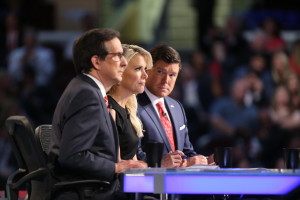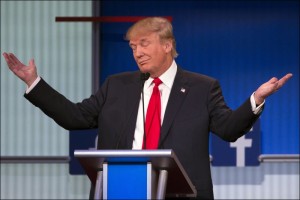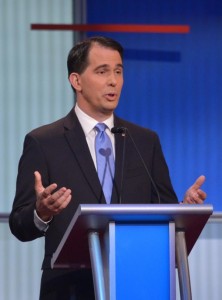 The conspiracy theories about the first GOP debate abound, mostly centered on the questions posed by the moderators. I’ve read that Fox was conspiring with Jeb Bush or with the GOP establishment or with the Democrats or with . . . well, you fill in the blank.
The conspiracy theories about the first GOP debate abound, mostly centered on the questions posed by the moderators. I’ve read that Fox was conspiring with Jeb Bush or with the GOP establishment or with the Democrats or with . . . well, you fill in the blank.
In my view, Chris Wallace, Megyn Kelly, and Bret Baier did a valuable service for all the Republican candidates on that stage. They made them come up with answers to some hard questions that they will have to face throughout this campaign. In one instance, there was some unfairness, but not where you may think. I’ll come back to that.
The first question of the debate, in my view, was a masterstroke and unquestionably fair. Asking the candidates to pledge support for the eventual nominee and not to run on a third-party ticket that would ruin the chances for that nominee was essential. Was it targeted at Donald Trump? To be sure. But he’s the one who has been hinting all along that he might bolt and do the third-party thing if he’s not nominated. Putting him on the spot to make a public declaration was a significant moment.
That he refused to take the pledge was quite informative. And if you listened carefully to his answer, he was pretty much saying he has no respect for any of the other candidates. When asked later when he became a Republican, he never gave a straight answer to the question.
 Trump was not singled out. Each candidate was confronted with either controversial statements made in the past or with views that he would have to defend. Only Trump, afterwards, went into whining mode, accusing the moderators of being “unfair.”
Trump was not singled out. Each candidate was confronted with either controversial statements made in the past or with views that he would have to defend. Only Trump, afterwards, went into whining mode, accusing the moderators of being “unfair.”
As is his habit, he let fly with the “loser” designation freely; during the debate, he also loved to use the word “stupid” with regularity, always referring to almost anyone in the government with whom he disagreed.
When the Frank Luntz focus group afterward revealed that he had lost significant ground with them, he attacked again, having his people call the group a “setup” designed to derail him.
Further, he descended upon Twitter to unleash other comments, specifically calling Kelly a bimbo and saying Fox should fire Charles Krauthammer, who had the audacity to say that the debate was the beginning of the end for Trump’s run for the White House.
 Now, let’s contrast Trump’s responses with how Scott Walker handled what I consider an uninformed, misleading question. When Kelly challenged him with being out of touch with 83% of the country on abortion because he didn’t include a “life of the mother” exception, he stayed calm and answered directly, correctly noting that there was no need for that dichotomy—either kill the baby or let the mother die—because there are all kinds of ways to keep the mother alive during a crisis pregnancy.
Now, let’s contrast Trump’s responses with how Scott Walker handled what I consider an uninformed, misleading question. When Kelly challenged him with being out of touch with 83% of the country on abortion because he didn’t include a “life of the mother” exception, he stayed calm and answered directly, correctly noting that there was no need for that dichotomy—either kill the baby or let the mother die—because there are all kinds of ways to keep the mother alive during a crisis pregnancy.
The Association of Pro-Life Physicians clarifies:
When the life of the mother is truly threatened by her pregnancy, if both lives cannot simultaneously be saved, then saving the mother’s life must be the primary aim. If through our careful treatment of the mother’s illness the pre-born patient inadvertently dies or is injured, this is tragic and, if unintentional, is not unethical and is consistent with the pro-life ethic. But the intentional killing of an unborn baby by abortion is never necessary. [emphasis mine]
Kelly needs to be better informed on this specific topic, but it’s one that many believe because of pro-abortion propaganda.
Walker simply stated his strong pro-life position and concluded by alluding to the atrocities of Planned Parenthood, against which he has stood as governor of Wisconsin.
After the debate, no one heard one word of whining from Walker. He praised the moderators as tough but fair, as have all the other candidates.
If Trump’s antics at this debate didn’t convince a person to stop supporting him, I don’t know what will. Yet I will continue to appeal to conservatives to recognize that he is no true conservative, and I will exhort my fellow Christian believers not to be deceived. Donald Trump is not the Christian conservative candidate we need. He is a disaster in the making.
